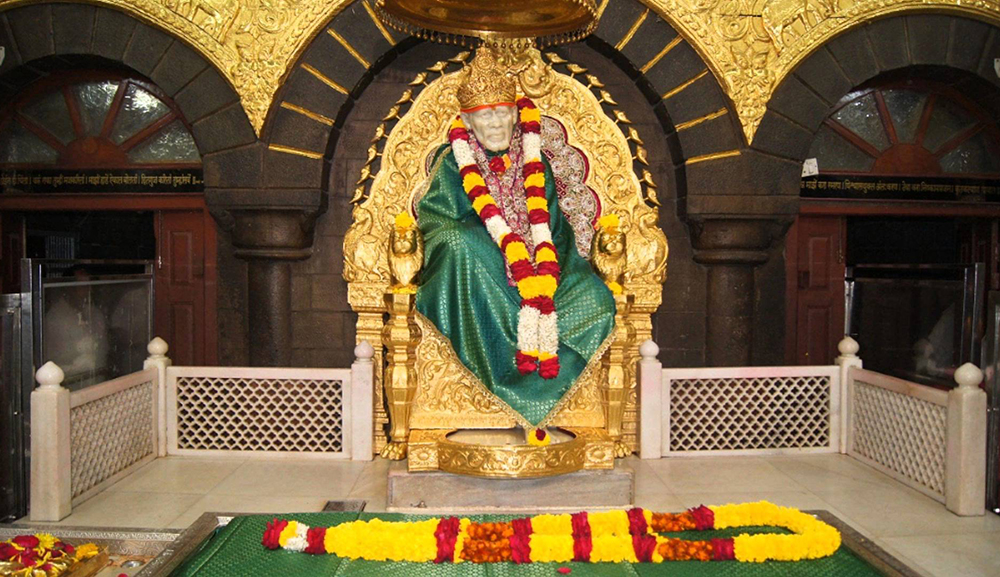Shri Sai Baba or Shirdi Sai Baba, born under an unknown name, was an Indian guru and fakir (wandering monk), who gained his regards amongst all by his Hindu and Muslim followers as a ‘Saint’. In his life and teachings he tried to embrace and reconcile both faiths: Sai Baba lived in a mosque, was buried in a Hindu temple, embraced Hindu and Muslim practices, and taught using words and figures that drew from both traditions. One of his well known epigrams says of God: "Allah Malik" and “Sabka Malik EK” (We all have the same ‘One’ God).
His life
Shri Sai Baba was born in very early hours of September 27 or 28, 1835 to a poor couple, who then left the new born infant in the woods, abandoned. The infant was found and adopted by a childless couple.

Sai Baba lived with them for 4 years. Meanwhile the man died. The wife was left to tend the child alone. Even as a small child Baba stir up sentiments between the Hindu and Muslim community by worshiping Allah in Hindu temples, and Hindu gods in the mosque. In fear of increased problems by a sole widow, Baba was handed over for care to a local mendicant and story-teller, Venkusa.
Sai Baba spent 12 years with his Guru. Some say that Baba practiced penance at the tomb of His Guru in the cellar under the Neem Tree at Shirdi”.
He arrived at the village of Shirdi in Maharashtra state when he was about sixteen years old. He took up residence in a Khandoba temple, where a villager, Mahalsapathi at worship first called him Sai (saint).
Sai Baba of Shirdi lived an extremely simple and austere life, sleeping on the floor of temple and later taking a mosque as his shelter. With his arrival to Shirdi, in no time he began exhibiting a mesmerizing attraction among people as they began flocking towards him. He was attributed many miracles, doing things that were beyond a mortal's power. He never encouraged these attributes but soon his fame spread like wild fire. Many pilgrims came seeking his blessings. Such was his charisma that even the mundane of his activities attracted large crowds. Sai soon began to attract followers who addressed him by the name Baba (father in Marathi language). He encouraged tolerance between all the faiths and religions.
Sai Baba’s Teachings:
Sai encouraged charity. He said: "Unless there is some relationship or connection, nobody goes anywhere. If any men or creatures comes to you, do not discourteously drive them away, but receive them well and treat them with due respect. Shri Hari (God) will be certainly pleased if you give water to the thirsty, bread to the hungry, clothes to the poor and your verandah to strangers for sitting and resting. If anybody wants any money from you and you are not inclined to give, do not give, but do not insult them."
Dada Bhagwan has mentioned about Sai Baba
If someone asks Gnani Purush, Dadashri that, ‘We are unhappy, suffering in misery then what should we do? Who should we worship?’ then Dada used to say, ‘Worship Shri Sai Baba of Shirdi. Shri Sai Baba is working a lot towards helping people to get rid of their miseries. He is such a great saint! Even now he is bestowing worldly happiness. He has only one desire, and that is to relieve the suffering of the masses. Absolutely pure and pious saint! A fakir without any attachments, he continues to be absorbed in the work of helping human beings. Even today he is doing this only”.
His legacy
Sai Baba is among the most popular of Indian saints, and continues to have a large following in Maharashtra. He is recognizable throughout India. Sai’s Darshan are made available at all Dada Bhagwan Trimandir as well. Many religious teachers, groups and organizations promote his teachings and devotion. Among the most prominent is the Shri Saibaba Sansthan Trust, which also takes care of the shrines and temples in Shirdi.